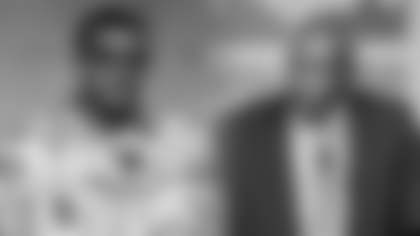Former Broncos defensive coordinator Larry Coyer, who spent seven seasons with Denver, has passed away at the age of 79.
"It is with a heavy heart that we announce Larry has passed away today after a sudden illness," the Coyer family wrote Friday. "Larry was a well loved man by many and we are processing this loss."
During his stint in Denver, Coyer led the team's linebackers from 2000-02 and then was the defensive coordinator from 2003-06. In that time, the Broncos made four playoff trips and appeared in one AFC Championship Game.
Coyer was a football lifer who logged more than four decades guiding football players from the high-school level to the NFL.
His coaching career began at his alma mater at Marshall, where he starred as a defensive back. Coyer led the Thundering Herd in interceptions in three seasons and set a school record for career interceptions that stood for more than two decades. Although NFL scouts showed some interest in him, Coyer opted to begin a coaching career when his playing days ended.
"It was an honest approach," Coyer said in 2004. "It was a tough decision. I stayed and coached. I never regretted it."
After coaching Marshall's defensive backs for a few years, Coyer got his first taste at calling defenses as the defensive coordinator for Ohio's Massillon High School. Over three seasons from 1970-72, Coyer's defenses allowed about 30 points per season — about three points per game.
Coyer then jumped to the collegiate level, coaching at Bowling Green, Iowa, Oklahoma State and Iowa State before three years in the USFL with the Michigan Panthers and Memphis Showboats. When the USFL disbanded before the 1986 season, Coyer coached at UCLA, Houston, Ohio State and East Carolina.
Before joining the Broncos in 2000, Coyer also coached at Iowa State and Pittsburgh and got his first taste of the NFL with the Jets in 1994.
Coyer, who had previously worked with then-defensive coordinator Greg Robinson in New York, was excited for the challenge of returning to the NFL. Even with about 30 years of coaching experience, he anxiously anticipated the chance to develop further as a coach.
"I've been running my own type of defense for such a long time that you kind of put your tag on and I think it's challenging to learn," Coyer said in 2000. "It keeps you growing."
In his time leading Denver's linebacking corps, Coyer coached an impressive collection of players that included Al Wilson, Bill Romanowski, Ian Gold, John Mobley and Keith Burns. Wilson earned two Pro Bowl selections in that time.
After the 2002 season, Coyer was promoted to defensive coordinator.
"His knowledge of the game is very well-rounded," then-head coach Mike Shanahan said when the move was announced. "His ability to relate to the players and coaches has been very impressive since he's been here."
Added Gold: "He's worked hard, and he's been the brains behind the defensive scheme we've had the last couple of years. He knows a lot more football than pretty much any other defensive coach I've been associated with."
Over the next four seasons, Coyer's unit ranked in the top 10 in scoring defense, and it twice ranked in the top four in rushing yards allowed. In 2005, as the Broncos marched to the conference title game, Denver ranked third in scoring defense with veteran stars Wilson, Champ Bailey and John Lynch leading the way.
Bailey in particular had his finest seasons during Coyer's tenure, as he recorded 21 interceptions in their three seasons together from 2004-06. More than a decade later, when Bailey was enshrined into the Pro Football Hall of Fame, Coyer remembered him as the best player he ever coached.
"This guy is the best football player I've ever seen," Coyer said in 2019. "However you say greatness, Champ Bailey's got it."
After his time in Denver, Coyer then coached for the Buccaneers and Colts. As Indianapolis' defensive coordinator, Coyer coached in Super Bowl XLIV. Then, in 2013, he worked as an advance scout for the Washington Commanders.
His final coaching job came the following year as New Mexico State's defensive coordinator, after which he retired from the profession.















